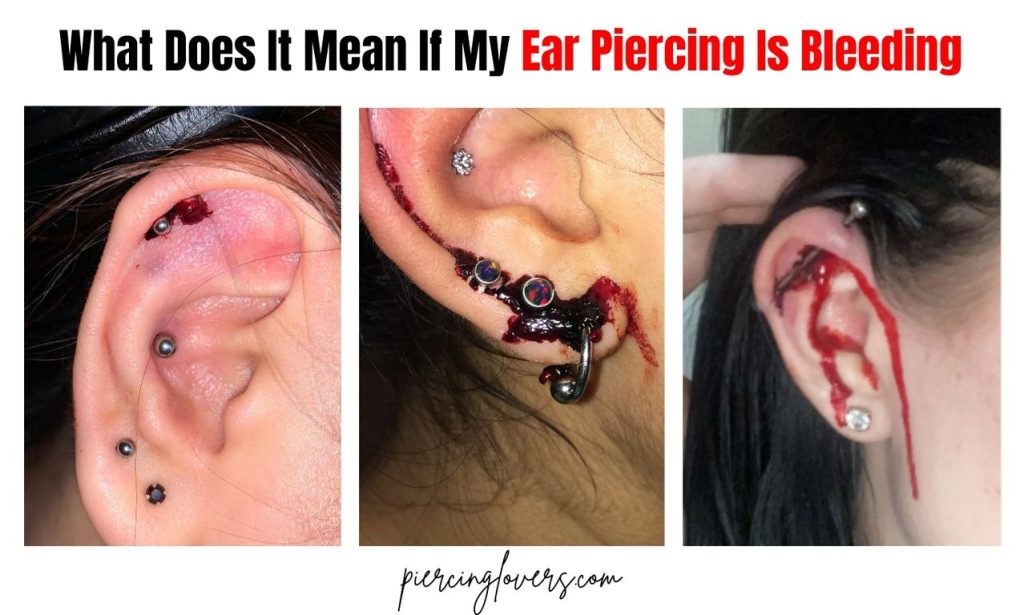If your ear piercing is bleeding, it could be due to irritation, infection, trauma, or an allergic reaction. New piercings can easily get irritated by movement or pressure, while infections occur if bacteria enter the piercing, causing redness, swelling, and pus. Trauma from accidentally bumping or pulling on the earring can also cause bleeding. Allergic reactions to certain metals, like nickel, can inflame the piercing.
To address this, gently clean the area with a saline solution twice daily, avoid touching or twisting the earring, and keep irritants away. Apply a small amount of antibacterial ointment if needed. If symptoms persist or you notice signs of infection, consult a professional piercer or doctor for further advice.
Piercing Aftercare – Piercing Bump & Keloid Removal Solution
Why Is My Ear Piercing Bleeding?
Here we are going to show you some reasons why ear piercing can bleed:
1. Irritation
New piercings can be easily irritated. This irritation can be caused by moving the earring too much, sleeping on it, or snagging it on clothes or hair. When a piercing gets irritated, it can start to bleed.
2. Infection
An infection is one of the more serious reasons for a piercing to bleed. Infections can occur if bacteria get into the piercing. Signs of infection include redness, swelling, warmth, pain, and discharge that is yellow or green in color.
3. Trauma
Accidentally bumping or pulling on your earring can cause trauma to the piercing site. This might happen if you catch your earring on clothing or if it gets tugged while you’re brushing your hair. Such trauma can cause the piercing to bleed.
4. Allergic Reaction
Some people are allergic to certain metals used in jewelry. If you have an allergic reaction to your earring, it can cause the piercing to become inflamed and bleed. Nickel is a common allergen in jewelry.
5. Changing Jewelry Too Soon
Changing your earring before the piercing is fully healed can cause damage to the tissue, leading to bleeding. It’s essential to wait until the piercing is completely healed before switching earrings.
You Can Use This Piercing Aftercare For Avoiding Bleeding And Infection
What To Do If Your Ear Piercing Is Bleeding
So, its now clear to you what does it mean why a ear piercing can bleed. And here we will provide you solutions about ear piercing bleeding. Lets see what to do if your ear piercing is bleeding.
1. Clean the Area
The first thing to do is to clean the area gently. Use a saline solution or a mixture of salt and warm water. Here’s how:
- Mix 1/4 teaspoon of non-iodized salt with 8 ounces of warm water.
- Soak a cotton ball in the solution.
- Gently dab the cotton ball around the piercing.
Do this twice a day to keep the area clean and reduce the risk of infection.
2. Avoid Touching It
Try to keep your hands off your piercing as much as possible. Touching it with dirty hands can introduce bacteria, leading to infection and further bleeding.
3. Look for Signs of Infection
Keep an eye out for symptoms of infection, such as redness, swelling, warmth, and pus. If you notice any of these signs, it’s important to take action quickly.
4. Use an Antibacterial Ointment
After cleaning the piercing, you can apply a small amount of antibacterial ointment. This helps to prevent infection. Make sure not to overdo it; a tiny amount is enough.
5. Avoid Irritants
Keep hair products, perfumes, and other potential irritants away from your piercing. These substances can irritate the skin and cause more bleeding.
6. Change Jewelry Carefully
If you think your jewelry is causing the problem, consider switching to hypoallergenic earrings. Before changing your earring, ensure your hands are clean and the new jewelry is sterilized. Be gentle to avoid causing more damage.
7. Don’t Remove the Earring
Unless instructed by a professional, don’t remove the earring if you suspect an infection. Removing it can close the hole and trap the infection inside, making the situation worse.
8. Consult a Professional
If the bleeding doesn’t stop or if you notice signs of infection, consult a professional piercer or a doctor. They can provide advice and treatment to help your piercing heal properly.
When to Seek Medical Attention If Your Ear Piercing Is Bleeding
While most cases of a bleeding piercing can be managed at home, some situations require medical attention. Seek help if:
- The bleeding doesn’t stop after a few hours.
- You experience severe pain or swelling.
- You notice yellow or green discharge.
- The area feels hot to the touch.
- You have a fever.
These signs could indicate a serious infection that needs professional treatment.
Preventing Future Problems For Ear Piercing
To avoid future issues with your ear piercing, follow these tips:
- Keep it clean: Regularly clean your piercing with saline solution.
- Be gentle: Avoid tugging or bumping your piercing.
- Choose hypoallergenic jewelry: Reduce the risk of allergic reactions by choosing high-quality, hypoallergenic earrings.
- Follow aftercare instructions: Stick to the aftercare routine provided by your piercer.
- Wait to change jewelry: Don’t change your earrings until the piercing is fully healed, usually after 6-8 weeks for earlobes and longer for cartilage.
Frequently Asked Questions
Q: Why is my ear piercing bleeding?
A: Your ear piercing could be bleeding due to irritation, infection, trauma, or an allergic reaction.
Q: How can I clean a bleeding ear piercing?
A: Clean the area gently with a saline solution or a mixture of salt and warm water. Dab the solution around the piercing with a cotton ball twice daily.
Q: Should I remove my earring if my piercing is bleeding?
A: It’s best not to remove the earring unless advised by a professional. Removing it can trap infection inside and close the hole.
Q: How can I tell if my piercing is infected?
A: Signs of infection include redness, swelling, warmth, pain, and yellow or green discharge.
Q: What should I do if my piercing is infected?
A: Clean the area with saline solution, apply a small amount of antibacterial ointment, and consult a doctor if symptoms persist.
Q: Can an allergic reaction cause my ear piercing to bleed?
A: Yes, an allergic reaction to certain metals, like nickel, can cause inflammation and bleeding.
Q: How long does it take for an ear piercing to heal?
A: Earlobe piercings typically take 6-8 weeks to heal, while cartilage piercings may take longer.
Q: What types of earrings are best for sensitive ears?
A: Hypoallergenic earrings made of surgical steel, titanium, or gold are best for sensitive ears.
Q: How can I prevent my ear piercing from bleeding?
A: Keep the area clean, avoid touching or twisting the earring, and keep irritants like hair products and perfumes away from the piercing.
Final Words
A bleeding ear piercing can be alarming, but understanding the causes and knowing how to care for it can help you manage the situation effectively. Whether it’s due to irritation, infection, trauma, or an allergic reaction, proper care and attention can ensure your piercing heals well. Always keep the area clean, avoid unnecessary handling, and consult a professional if needed. With the right approach, you can enjoy your piercing without further complications.





